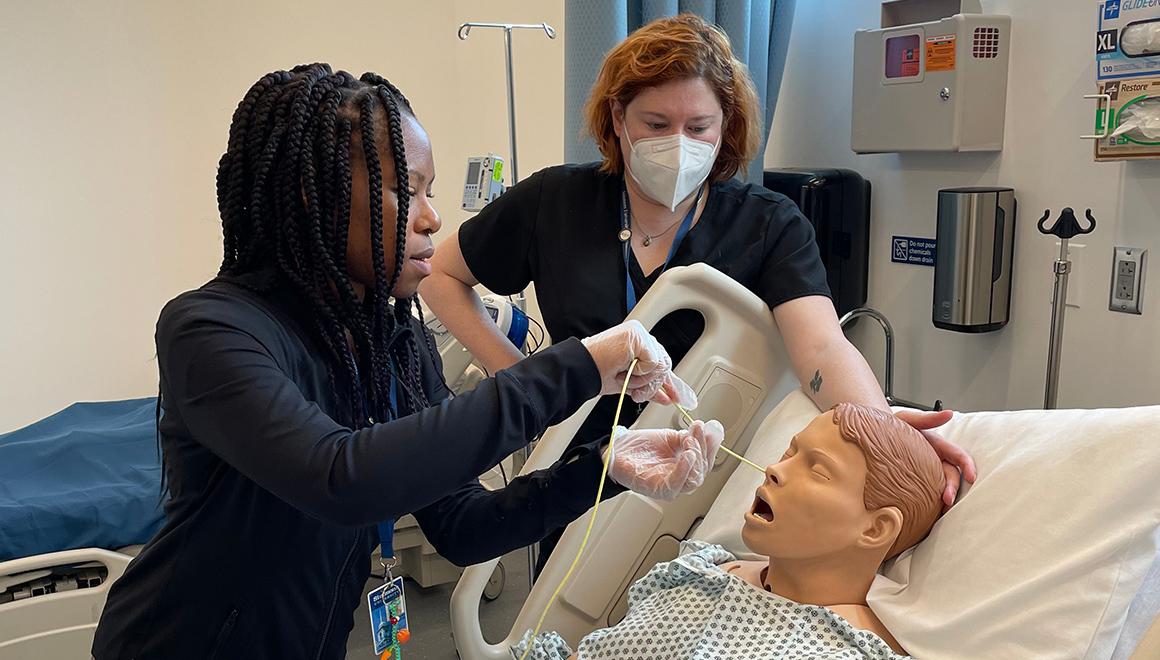Dietetic Internship Program

Gains hands-on experience in nutrition at Boston’s leading institutions
Simmons University’s full-time Dietetic Internship Program provides you with the foundational supervised practice you need to launch your career as a Registered Dietitian Nutritionist (RDN).
You can pursue the program in three ways:
- Standalone Dietetic Internship: For students who already hold a master’s degree and a Didactic Program in Dietetics (DPD) verification statement.
- Master of Science in Nutrition and Health Promotion + Dietetic Internship (MSDI) Track: For students with a bachelor’s degree and a DPD verification statement.
- Simmons Master of Science in Nutrition and Health Promotion + Partner DI (MS+DI) Joint Program: For students who wish to pursue Simmons’ Master of Science in Nutrition and Health Promotion while completing their supervised practice with one of our partner dietetic internship programs.
Not sure which nutrition program is right for you? Visit “Become a Registered Dietitian Nutritionist (RDN) at Simmons" for academic guidance on becoming an RDN.
DI Program Eligibility
To begin the Dietetic Internship, you must hold a graduate degree — or have one in process — and a DPD verification statement. Simmons’s BS in Nutrition and Dietetics includes the DPD certification. We also offer a Certificate in Didactic Program in Dietetics (DPD) to help you meet this requirement.
I love the fact that Simmons was not only in Boston, but it's also a women-centered school, which gave me a sense of safety and community. I felt like I could really be myself here. – Jamin Dieb ’24
Dietetic Internship Experience
As a Simmons intern, you’ll gain hands-on experience in acute care, community nutrition, and food service management, along with specialized training in one of our concentrations. You’ll graduate ready for entry-level practice in a variety of practice settings.
Simmons offers three options for completing your Dietetic Internship:
Standalone Dietetic Internship Certificate
- A full-time, 35-week program
- Includes all required supervised practice hours delivered through field site rotations, the DI course, and one graduate course that may be applied for graduate credit.
- Specialty Concentration: Community Nutrition, where you’ll complete rotations in a range of community-based settings including community health centers, private practice, outpatient nutrition counseling sites, and public health and wellness-focused settings. Our students build on evidence-based research — highlighting culturally and economically sensitive standards of practice, nutritional care and disease prevention.
MSDI Track (Master of Science in Nutrition and Health Promotion + Dietetic Internship)
- A 21-month program
- Combines Simmons’ Master of Science in Nutrition and Health Promotion with supervised practice, which is completed at Simmons. You can choose to start the MS online in the first year or come to Boston and join us on campus.
- Choose a concentration in Community Nutrition, or apply for one of two additional options (limited number of spots available):
- Treatment of Eating Disorders: Gain hands-on experience in private practice, outpatient, and higher levels care eating disorder treatment facilities.
- Pediatrics: Gain experience in pediatric acute care, and community-based pediatric sites.
Simmons Master of Science in Nutrition and Health Promotion + Partner DI (MS+DI) Joint Program
- An expedited pathway that allows you to pursue Simmons’ Master of Science in Nutrition and Health Promotion (online or in-person) while completing your supervised practice with one of our partner dietetic internship programs.
- We have partnerships with dietetic internship programs at Beth Israel Deaconess Medical Center, Massachusetts General Hospital, Hebrew Rehabilitation, Be Well Solution (distance internship), and Wellness Workdays (distance internship).
- You’ll benefit from a streamlined joint application process and Simmons’ academic advising to help you coordinate your experience in the MS with your supervised practice experience. Our partner internships provide a range of training opportunities for students who may want a specialized type of training including experience in a Boston teaching hospital, or a more flexible program with an emphasis in wellness through our distance partners.
Throughout the DI Program, you’ll be placed in diverse practice settings, gaining experience with patients and populations across a variety of health needs. You’ll also participate in internship classes, review sessions, and joint programming, creating a strong professional network before you graduate.
Highlights of Simmons Nutrition Program
97%
Simmons Dietetic Internship Program RDN Exam Pass Rate
Simmons graduates consistently surpass the national pass rate average on the Registration Exam for Dietitian Nutritionists. The national average is 88%.
100+ Years
History of Nutrition Education at Simmons
Simmons’ history of nutrition education spans more than a century, highlighted by our department’s many contributions to nutrition science, health, and wellness.
Spotlight on Nutrition Students and Alums
Our Faculty
The faculty in the Nutrition Department are nationally known in their area of expertise. Each has years of practice experience in their areas of teaching. They have served in state government boards and national committees, and won national awards.
They are dedicated educators committed to the success of our students. Each student will have a faculty advisor in nutrition who will provide individualized guidance for coursework selection and career planning.











